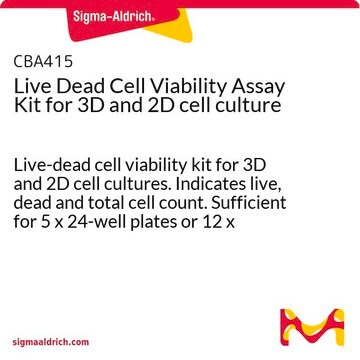17783
Calcein-AM
suitable for fluorescence, BioReagent, ≥95.0% (HPLC)
Synonym(s):
Calcein acetoxymethyl ester, Calcein O,O′-diacetate tetrakis(acetoxymethyl) ester
About This Item
Recommended Products
product line
BioReagent
Quality Level
Assay
≥95.0% (HPLC)
fluorescence
λex 496 nm; λem 516 nm in 0.1 M Tris pH 8.0, esterase; Ca2+
suitability
suitable for fluorescence
storage temp.
−20°C
SMILES string
CC(=O)OCOC(=O)CN(CC(=O)OCOC(C)=O)Cc1c(OC(C)=O)ccc2c1Oc3c(CN(CC(=O)OCOC(C)=O)CC(=O)OCOC(C)=O)c(OC(C)=O)ccc3C24OC(=O)c5ccccc45
InChI
1S/C46H46N2O23/c1-25(49)60-21-64-39(55)17-47(18-40(56)65-22-61-26(2)50)15-32-37(68-29(5)53)13-11-35-43(32)70-44-33(16-48(19-41(57)66-23-62-27(3)51)20-42(58)67-24-63-28(4)52)38(69-30(6)54)14-12-36(44)46(35)34-10-8-7-9-31(34)45(59)71-46/h7-14H,15-24H2,1-6H3
InChI key
XKFSBWQWNMZWFA-UHFFFAOYSA-N
Looking for similar products? Visit Product Comparison Guide
Related Categories
General description
Application
Storage Class Code
11 - Combustible Solids
WGK
WGK 3
Flash Point(F)
Not applicable
Flash Point(C)
Not applicable
Personal Protective Equipment
Certificates of Analysis (COA)
Search for Certificates of Analysis (COA) by entering the products Lot/Batch Number. Lot and Batch Numbers can be found on a product’s label following the words ‘Lot’ or ‘Batch’.
Already Own This Product?
Find documentation for the products that you have recently purchased in the Document Library.
Customers Also Viewed
Our team of scientists has experience in all areas of research including Life Science, Material Science, Chemical Synthesis, Chromatography, Analytical and many others.
Contact Technical Service









